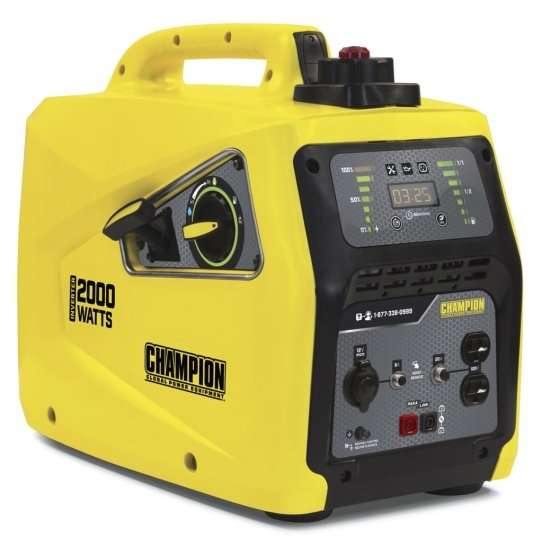Note: I get commissions for purchases made through links in this post.
Champion makes a lot of models of portable generators. A lot. They sell a lot of them too and for good reason. Based on reviews, that I’ll mention more about later, they are highly rated by users.
There are far too many models to cover in a single article (that you’d want to read), so in this overview and review I’ll give you details about those at the lower end of the power spectrum and briefly refer you to those at the higher end for now. You can check them out on your own until an article specifically about them gets written.
Champion makes Canadian-specific versions of many of the models discussed here. If you live in Canada and are interested in one of the models mentioned in this article, you probably will be able to find one very similar to it that meets Canadian requirements.
If you’re in a hurry and just want to check the pricing and availability of some Champion generators at Amazon, you can click a link in the list below. (There are more links for the more powerful models at the end of the article.)
- Champion 1500 Watt
- Champion 2000 Watt Inverter
- Champion 3100 Watt Dual Fuel Inverter
- Champion 3100 Watt Wireless Start Inverter (2-pack)
If you want to skip ahead to a certain section of this review, click a link in the table below. Otherwise, just keep scrolling and reading as usual.
Starting Watts or Running Watts?
Comparing generators can be difficult if you don’t realize whether you’re looking at the starting wattage or the running wattage of given models.
Champion’s website doesn’t make it any easier.
If you look at all their models from least to most powerful, you’ll see that they list their first generators according to running watts. But suddenly, when you get to 2000 starting watts, they list them by starting watts, which is also the large number on the side of the unit.
Those who first listed these machines at Amazon were not necessarily consistent either. Some titles may show starting watts while others may tell you running watts. Some may show both. So be careful. Checking that actual model number is always a good thing.
The wattages listed in this article will be starting watts.
Champion 1500 Watt Portable Generator
Champion’s 1500 Watt model is the smallest in its lineup. Even at this low end, Champion makes two slightly different versions. Actually, their website shows 3 models, but two of them – 42436 and 100490 – appear to have the same specifications.
The third model (100403) has 120V 20A duplex, covered outlets, and Intelligauge voltmeter, and a slightly larger (1.7 gallon) gas tank compared to the others.
You can expect to use this generator for smaller appliances and the occasional outing when you’re away from the grid for a time. It’s not really designed for longer use, for example, during a power outage after a hurricane or other major storm.
I almost didn’t include the video below due to the amateur quality, but it’s one of very few available for this purpose. You will at least get a good idea of what the 1500W generator is like.
Champion 2000 Watt Portable Inverter Generators
There are also 3 nearly identical 2000 Watt portable generators in the Champion arsenal. Unlike the 1500 above, these are all inverter units.
At least, I think they are.
The Champion site describes them all as inverters, but the model of one (100489) is lacking the “i” at the end that normally signifies an inverter. Other than model number, you’ll be hard pressed to find any difference between this unit and model 73536i.
Model 73540i has an outlet called “12V DC automotive” that the other two don’t have. This model also does not come with engine oil as the others do.
Being a little more powerful, you might consider using this machine for a more extended period of time, but I’d prefer to hold out for something even bigger if I really had major power problems.
Champion 3100 Watt Dual Fuel Inverter Generator
Apparently Champion is simply not consistent in assigning model numbers to its machines. Here again we have an apparent inverter without the trailing “i” in its name. Not to overstate this variation, but it’s something you should be aware of when checking out various models. Just because you don’t see an “i”, don’t assume you don’t have an inverter in your sights.
Champion makes four 3100 watt generators. Two of them – 100158 and 75531i – are “regular” units. The main differences between them are the automotive, GFCI, covered outlet, parallel capability, voltage regulator, and inclusion of oil.
The dual fuel model (100204) is similar to the 100158, except that you can use propane (LPG) instead of gasoline. When using propane, you need to realize that you will get less power from the generator. Propane gives you just 2800 starting watts and 2520 running watts.
Champion 3100 Watt Wireless Start Inverter Generator
The Champion 3100 wireless is probably most similar to model 75531i, with the major addition of electric and wireless starting capabilities. To go with that, it also has a battery inside.
The only other difference is that it does not have an automatic voltage regulator.
Let’s take a side by side look at the specifications of these generators in the table below so you can see at a glance which one has the most features you are interested in.
Note that all of these models have a low oil shutoff mechanism and are CARB compliant.
Champion’s website also makes a mess of run times. See below the table for an explanation.
| Model | 1500W | 2000W | 3100W Dual | 3100W Wireless |
| Gas Starting (W) | 1500 | 2000 | 3100 | 3100 |
| Gas Running (W) | 1200 | 1700 | 2800 | 2800 |
| LPG Starting (W) | n/a | n/a | 2800 | n/a |
| LPG Running (W) | n/a | n/a | 2520 | n/a |
| Inverter? | No | Yes | Yes | Yes |
| Parallel Capability? | No | Yes | Yes | No |
| DC Operation? | No | Yes | Yes | Yes |
| Voltmeter? | Yes | No | No | No |
| Start Type | Recoil | Recoil | Recoil, Electric | Recoil, Electric, Wireless |
| Fuel Capacity (gal.) | 1.5 | 1.0 | 1.6 | 1.6 |
| Model | 1500W | 2000W | 3100W Dual | 3100W Wireless |
| Outlets | 120V 20A (5-20R) | 120V 20A Duplex (5-20R), 12V DC | 120V 30A (TT-30R), GFCI 120V 20A Duplex (5-20R), 12V DC Automotive | 120V 30A (TT-30R), 120V 20A Duplex (5-20R), 12V DC Automotive |
| GFCI? | No | No | Yes | No |
| Covered Outlets? | No | No | Yes | No |
| Decibels | 65 | 53 | 58 | 58 |
| Wheels? | No | No | Yes | Yes |
| Model | 1500W | 2000W | 3100W Dual | 3100W Wireless |
| Length (in.) | 17.8 | 19.3 | 25.1 | 25.1 |
| Width (in.) | 14.0 | 13.2 | 17.3 | 17.3 |
| Height (in.) | 14.8 | 16.3 | 18.3 | 18.3 |
| Weight (lbs.) | 52.9 | 48.5 | 96.8 | 96.6 |
Champion usually rates their machines for run time at ¼ load, unlike many other manufacturers who rate this at ½ load. But Champion does give this figure for the 1500W model at ½ load. And don’t forget that the dual fuel model(s) will have a different set of numbers when using propane.
Yes, it’s confusing, but here is what they tell us.
The 1500W model has a gasoline run time at ½ load of 10 hours.
The 2000W model has a gasoline run time at ¼ load of 9.5 hours.
The 3100W dual fuel model has a gasoline run time at ¼ load of 8 hours and a propane run time of 19 hours.
The 3100W wireless model has a gasoline run time at ¼ load of 8 hours.
Champion Midrange and High End Portable Generators
Moving beyond the models described above, you get power ranging from 3400W all the way up to 15,000W. The higher you go, the more features you may find, the larger and heavier the unit will be, and obviously the more it will cost.
Some models differ only in style; that is, they might be camouflage or painted in patriotic colors.
The Champion website does have a good comparison feature that shows you the differences among up to 3 models. It’s nice that it only shows the differences initially, and you can expand the results to see all the similar features if you want, too.
Here is a quick list of the starting wattages, so you can see if there is a more powerful machine in the range you need. Spoiler alert: There probably is.
(I didn’t include links to Amazon for each of these because there are many not currently available for sale there – though this can and does change from time to time. You may find them on the Champion site and elsewhere though.)
|
|
Conclusions about Champion Portable Generators
What I find most amazing about Champion generators is the great variety of choices. There are 19 different wattages shown above. Almost all of them have more than one variation – dual fuel, wireless, etc. – and that doesn’t even take the Canadian models into consideration.
If Champion doesn’t have the power you need in a portable machine, it probably doesn’t exist. Either that, or you are way too picky.
Ratings of Champion generator models are very good. When many hundreds of people submit reviews (at Amazon, for example) and an item still ranks at about 4 stars (out of 5) or better, you know that’s a really good item.
Here is what one happy owner says.
“This is a terrific little generator. I’ve put around 1300 hours on it in the last three months as it’s my backup to my solar system that powers my whole house and it’s still running strong. It starts easily, had less issues in extreme cold (-27F) than a much more expensive Honda, and is extremely efficient.”
Another user is pleased with its efficiency, as I think you will be too.
“This generator is awesome on fuel consumption and does not weigh too much. It’s quiet – almost as quiet as a honda – and it doesn’t BOG DOWN as some gens do.” [Edited for capitalization and punctuation.]
Check out the Champion line of portable generators at Amazon now!

